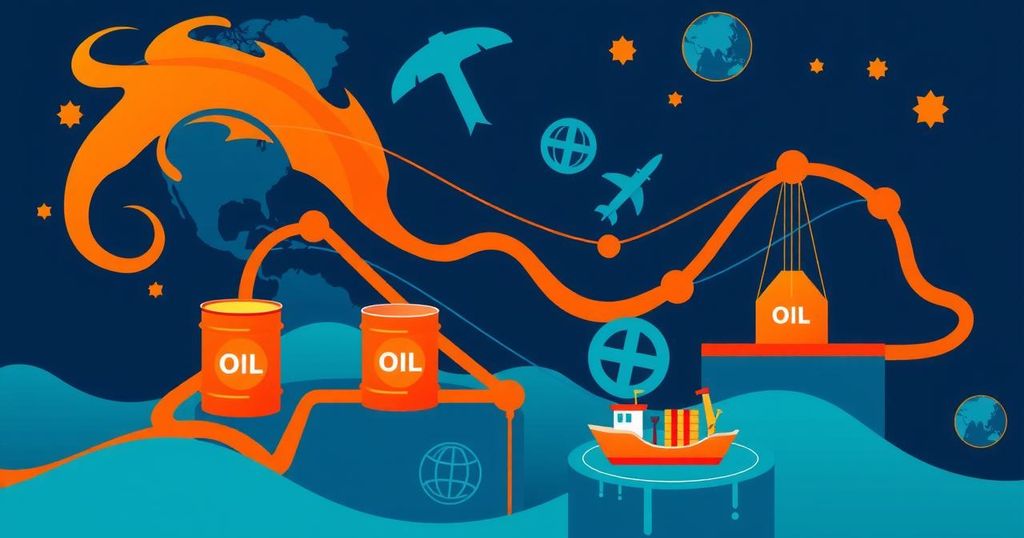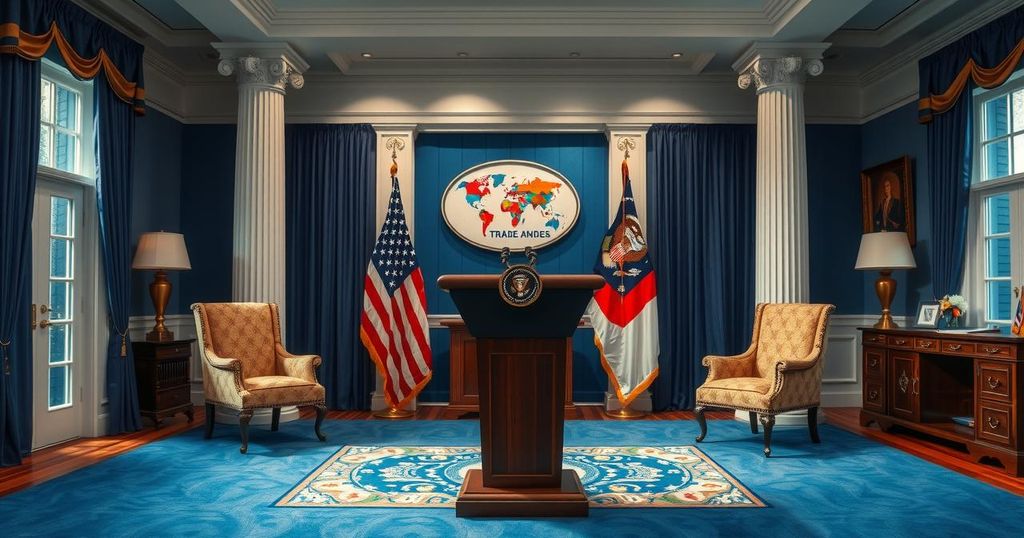Politics
ASIA, CARACAS, CHINA, CUBA, DONALD TRUMP, EUROPE, FINANCIAL TIMES, GEOPOLITICS, HOUSE, INDIA, MEXICO, NATIONAL SECURITY, NICOLAS MADURO, NORTH AMERICA, RELIANCE INDUSTRIES, SOUTH AMERICA, SPAIN, THE FINANCIAL TIMES, TRADE, TRUMP, UNITED STATES, US, US-CHINA RELATIONS, VENEZUELA, WASHINGTON, WHITE HOUSE
Sophia Klein
Trump’s New Tariff Threat on Venezuelan Oil: Implications for India
President Trump’s announcement of a 25% tariff on countries buying Venezuelan oil could create significant disruption in global oil markets, particularly affecting India and China as major importers. The tariffs are set to coincide with reciprocal tariffs against U.S. trading partners and reflect broader U.S. strategies towards Venezuela. India, having increased its oil purchases from Venezuela, might face increased trading costs due to these developments.
In a significant announcement, United States President Donald Trump revealed that a 25% “secondary tariff” will be imposed on countries purchasing Venezuelan oil, effective April 2. This decision coincides with reciprocal tariffs on the United States’ trading partners, including India. The tariffs are likely to result in increased trading costs for nations such as India and China, both of which are substantial buyers of Venezuelan provisions.
This strategy appears to be part of a broader effort by the Trump administration to exert pressure on nations engaging in commerce with Venezuela, which has been characterized by Washington as fostering hostility towards the United States. As such, India’s oil imports from Venezuela may face challenges due to the looming threat of these tariffs.
Recent reports highlight India’s position as a top buyer of Venezuelan crude oil, especially following eased sanctions on Venezuelan oil imports. In December 2023 and January 2024, India was notably the largest purchaser of Venezuelan oil, amidst ongoing geopolitical dynamics. Last year, Venezuela reportedly exported around 660,000 barrels of crude oil per day, with India, China, and Spain emerging as significant consumers.
Given the volatile nature of the global energy market, Trump’s tariff announcement could lead to dramatic fluctuations, prompting concerns regarding potential increases in petrol prices for American consumers. To mitigate such risks, the White House has been careful in navigating the implications of this policy.
India has actively sought to diversify its oil sources, making investments in Venezuelan imports; the country procured approximately 22 million barrels in 2024, accounting for about 1.5% of its total crude oil imports. Despite historical sanctions imposed during Trump’s previous term, India’s Reliance Industries has successfully secured U.S. approval to import Venezuelan oil, reflecting its strategic position in the energy sector.
The Oil and Natural Gas Corporation has also expressed interest in a waiver to lift sanctions against Venezuelan crude, indicating ongoing negotiations and adjustments in response to changing U.S. policies. This continuous interplay of sanctions and tariffs underscores the complexities faced by nations in balancing energy needs and international relations.
The imposition of a 25% secondary tariff on countries purchasing Venezuelan oil by President Trump could considerably impact global oil markets, particularly for nations like India and China. As India’s engagement with Venezuelan oil increases, so does the risk of facing heightened trade costs. This development necessitates close observation as India navigates its energy needs amidst evolving U.S. sanctions and tariffs.
Original Source: www.indiatoday.in








Post Comment